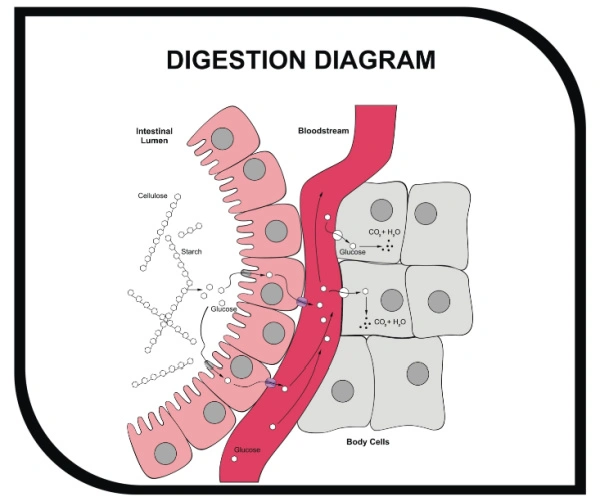Carbohydrates are your body’s primary source of energy, especially during moderate to intense runs and races. Just like you wouldn’t expect a car to run without fuel, you can’t expect your body to perform its best without carbohydrates.
If you want to optimally fuel your body for peak performance, this article unlocks the science behind carbs, dispelling common misconceptions and equipping you with the knowledge to fuel your runs like a pro.
Introduction to carbohydrates:
Carbs are often unfairly demonized in today’s low-carb, diet trends. Carbs are not bad for you. Let me say it again, carbs are not bad for you.

Dozens of research studies and clinical trials have showed over and over again that there is little to no difference in weight loss or reduced risk of heart disease when compared to low-carb or no-carb diets. (See sources and citations section below).
Obviously, we can’t over-consume carbohydates, but carbohydrates are not your enemy when choosing the right carbohydrates and as part of an overall healthy diet.
As you will read about below, carbohydrates are your secret weapon to combat low energy levels and fatigue, especially during moderate to high intensity exercise.
What is a carbohydrate?
A carbohydrate is a naturally occurring molecule made up of carbon, hydrogen, and oxygen and serves as one of the three main sources of energy and nutrients for the body.
Carbohydrates are found in a wide variety of plant-based foods, including fruits, vegetables, grains, and legumes. They are also present in some processed foods, such as bread, pasta, and cereal.
Carbohydrates contain 4 calories per gram.
Why are carbs important?
Carbohydrates are the body’s preferred and most readily available source of energy.

When we eat, food is broken down into simple sugars like glucose, which are absorbed into the bloodstream and transported to cells.
With the help of insulin, glucose enters cells and undergoes a series of transformations, ultimately releasing energy stored in the form of adenosine triphosphate (ATP).
ATP serves as the cell’s energy currency, powering essential cellular functions like muscle contraction, brain activity, and organ operation.
Glycogen – Our primary fuel source for running
For long-term energy storage, the body converts some of our excess glucose into glycogen, a complex carbohydrate stored in the liver and muscles. When energy demands increase, glycogen is broken back down into glucose, providing a readily available source of fuel.
The problem with glycogen is that it is a fixed resource. We do not have an unlimited supply. We must replenish it, especially if running for longer that 90 minutes.
The main storage sites for glycogen are:
1. Liver: Approximately 100 grams of glycogen can be stored in the liver. This glycogen serves as a readily available source of energy for maintaining blood sugar levels between meals and during fasting periods. The liver stores approximately 30% of the body’s total glycogen.
2. Muscles: Around 500 grams of glycogen can be stored in skeletal muscles. This glycogen is used to fuel muscle contractions during physical activity. Muscles store approximately 70% of the body’s total glycogen.
3. Brain: Small amounts of glycogen are also stored in the brain and nervous system to support their energy needs.
Body fat and muscle proteins – Our secondary fuel source for running
When carbohydrates and glycogen are scarce, the body has a backup plan – converting protein and body fat into glucose.
While these alternative fuel sources can keeps us running, they are not as readily-available and efficient as glycogen that comes from our carbohydrates. Muscle proteins are highly inefficient and should be avoided at all cost. Forced conversion in this manner, leads to muscle breakdown, extreme fatigue, and long-term can contribute to severe health issues.
Body fat can be an efficient fuel source when intensity levels are low. This is why as endurance runners, we frequently train at low intensity (easy pace runs) in order to make our bodies more efficient at using body fat as a source of energy.
This intricate interplay between our intensity levels during races and training, along with glucose, glycogen, body fat, and the creation of ATP ensures that our bodies have the energy they need to function optimally.
5 additional reasons why carbohydrates are important:
- Blood Sugar Regulation:
When consumed properly and in a timely fashion, carbohydrates help maintain stable blood sugar levels, preventing sudden spikes and crashes that can disrupt energy levels and overall health. When we consume carbohydrates, the body releases insulin, a hormone that helps transport glucose from the bloodstream into cells. - Digestive Health:
Carbohydrates, particularly fiber, contribute to a healthy digestive system. Fiber adds bulk to stool, promoting regular bowel movements and preventing constipation. It also feeds beneficial gut bacteria, which are essential for overall digestive health and immune function. - Nutrient Delivery:
Many carbohydrate-rich foods, particularly fruits, vegetables, and whole grains, are excellent sources of essential vitamins, minerals, and antioxidants. These nutrients play crucial roles in various bodily functions, from supporting bone health to boosting the immune system. - Muscle Recovery:
Carbohydrates are essential for muscle repair and glycogen replenishment after exercise. Glycogen is stored in the muscles and liver, providing a readily available source of energy during physical activity. Consuming carbohydrates after exercise helps replenish glycogen stores, promoting muscle recovery and reducing fatigue. - Brain Function:
Carbohydrates are crucial for brain function. Glucose is the primary energy source for the brain, providing the fuel needed for cognitive processes, memory, and mood regulation.
Types of carbohydrates: simple vs. complex
Carbohydrates are classified into two main categories: simple and complex. Understanding the differences between these two types is crucial for making informed dietary choices that support your running performance.
1. Simple carbohydrates
Simple carbohydrates, also known as simple sugars, are composed of single or two sugar units. They are easily absorbed into the bloodstream, resulting in a rapid spike in blood sugar levels. This rapid rise in blood sugar, followed by a quick drop, is characterized by a high glycemic index (GI).
Characteristics of Simple Carbohydrates
Quick absorption and high glycemic index (GI)
Provide a rapid burst of energy
Often found in processed foods, sugary drinks, and refined grains
Examples of Simple Carbohydrate Food Sources:
Table sugar
High-fructose corn syrup
Honey
Candy
White bread
White rice
Fruit juices
Sugary sodas
2. Complex Carbohydrates
Complex carbohydrates, also known as polysaccharides, are composed of many sugar units linked together. They are digested and absorbed more slowly than simple carbohydrates, leading to a more gradual and sustained release of energy. This slower absorption results in a lower glycemic index (GI).
Characteristics of Complex Carbohydrates:
Sustained energy release and lower glycemic index (GI)
Provide longer-lasting energy
Rich in fiber and other nutrients
Often found in whole grains, fruits, vegetables, and legumes
Examples of Complex Carbohydrate Food Sources:
Whole grains: oats, quinoa, brown rice, whole-wheat bread, pasta
Fruits: apples, bananas, berries, oranges
Vegetables: potatoes, carrots, broccoli, spinach
Legumes: lentils, beans, chickpeas
Carbohydrates and Running:
Timing and the type of carbohydrates you consume significantly impacts your running performance. For shorter-duration runs, carbohydrates are not needed during the run. All you need is water. However, eating a light meal or snack a couple of hours before your run can make a significant difference on how you feel and perform.
Below are some general guidelines to keep in mind. The results someone has when it comes to sports nutrition and fueling is unique to each person. As a coach I work with athletes to help dial in their nutrition as well as help them develop fueling and hydration plans that go beyond the scope of this article.
Timing of carbohydrate intake for runners
For optimal running performance, it is recommended to focus on consuming complex carbohydrates as the primary source of your carbohydrate intake, especially with pre-run and post run meals. This helps ensure you are properly topped off when it comes to refilling your glycogen stores.
Carbohydrate consumption or fasted cardio?
I work with athletes all the time who try to skip carbohydrates prior to a workout, hoping that they burn more fat. The reality is while more fat may get utilized, their performance suffers.
A popular fad right now is fasted cardio. The problem with fasted cardio is that unless you are doing a keto or keto-like diet, you have enough glycogen in your liver and muscles to properly fuel you for up to 60-90 minutes of exercise so stored glycogen will still be the primary energy source your body will use. Some body fats will be burned, but I have not found any significant studies showing that in runs up to 60-90 minutes, you use significantly more fat utilization through a fasted cardio approach.
If you find one, please send it to me. Runners who are also keto, then yes, fat utilization is the primary storage used, however, higher intensity runs will be limited due to the slow speed of the fat utilization to glucose that occurs.
For most, being fueled on our runs is a great thing, not something to be avoided. Being improperly fueled before and during runs can lead to high levels of hunger cravings in the hours and days to follow. For me, that is not worth it.
Pre-run carbohydrate recommendations for optimal energy levels
Pre-exercise carbohydrate intake is essential for providing a readily available energy source and preventing fatigue during exercise. Consuming a carbohydrate-rich (not carbo loaded) meal or snack 1-3 hours before a run is recommended. The carbohydrate consumed should be a complex carbohydrate, such as whole grains, fruits, or vegetables, to provide sustained energy release.
Carbohydrate strategies for maintaining glycogen stores and performance on the run
During prolonged exercise (greater than 60-75 minutes), it is recommended to consume carbohydrates to maintain glycogen stores and prevent fatigue. The type and amount of carbohydrates consumed during exercise will depend on the intensity and duration of the activity. For runs over 60 minutes, supplement your diet with simple carbohydrates like those found in sport drinks or gels, to prolong the depletion on glycogen.
For very long runs, a combination of simple and complex carbohydrates is recommended to provide sustained energy release. This is why ultrarunning events often have real food at checkpoints. The longer you run (usually measured in hours), the more your body needs, that can’t be 100% supplemented through food or sport gels and drinks.
Post-run carbohydrate intake for glycogen replenishment and recovery
Post-exercise carbohydrate intake is essential for replenishing glycogen stores and facilitating muscle repair. Consuming carbohydrates as soon as you can after exercise is crucial to maximize glycogen replenishment.
The type of carbohydrate consumed should be a combination of simple and complex carbohydrates to provide both a quick energy boost and sustained energy release. I prefer to choose quality carbohydrates over an abundance of simple carbohydrates, but feel free to introduce a small-portioned, tasty snack if you wish as a reward.
Individual nutrition plan
I work with athletes at all levels dial in their nutrition needs and help them create individual fueling and hydration plans for races. As a certified nutrition coach, I can help you develop healthy eating habits and incorporate running, strength training, mobility and more to run healthy, live healthy and feel great while doing it. If I can be of any assistance, please feel free to reach out for more information.
Sources and Citations
TJensen J, Rustad PI, Kolnes AJ, Lai YC. The role of skeletal muscle glycogen breakdown for regulation of insulin sensitivity by exercise. Front Physiol. 2011 Dec 30;2:112. doi: 10.3389/fphys.2011.00112. PMID: 22232606; PMCID: PMC3248697.
Naude CE, Brand A, Schoonees A, Nguyen KA, Chaplin M, Volmink J. Low-carbohydrate versus balanced-carbohydrate diets for reducing weight and cardiovascular risk. Cochrane Database Syst Rev. 2022 Jan 28;1(1):CD013334. doi: 10.1002/14651858.CD013334.pub2. PMID: 35088407; PMCID: PMC8795871.
Alberts B, Johnson A, Lewis J, et al. Molecular Biology of the Cell. 4th edition. New York: Garland Science; 2002. How Cells Obtain Energy from Food.
- About the Author
- Latest Posts

Steve Carmichael is a running coach, sports performance coach, nutrition coach and has been a recreational runner for over 18 years. Steve holds multiple certifications as a certified running coach through the RRCA and USA Track and Field as well as he is a NASM certified personal trainer, and PN1-L1 certified nutrition coach.
Steve has been coaching since 2010 and has helped thousands of runners online and in the Central Ohio area maximize performance and run injury-free.
Steve is the founder of RunBuzz and Run For Performance.com. If you are interested in working with Steve though his online running and strength coaching services, feel free to reach out.

